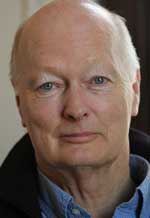
“BLESSINGS AND OFFENCE:” Director’s Notes about “A Midsummer Night’s Dream”
Patrick Swanson, who directs our upcoming A Midsummer Night’s Dream, talks about what inspires his approach to this popular play.
“Hand in hand with fairy grace Will we sing, and bless this place”
These lines spoken by Oberon at the end of the play got my attention – the simplicity of the rhyme, the clarity of the job to be done and the dignity of the blessing. They remind me of the lines that the ancient mummers say at the end of their seasonal performance that traditionally brings good luck to the house that they have visited. The English mumming tradition had been around long enough for Shakespeare to have been familiar with it. Indeed there is a company of rough actors central to Shakespeare’s play and occasionally we hear an echo of a traditional mummers line like Puck’s, “I am sent with broom before to sweep the dirt behind the door.” The blessing is counterbalanced in the epilogue by a peculiar apology:
“If we shadows have offended
Think but this, and all is mended,
That you have but slumber’d here
While these visions did appear”
Without definitive evidence, some scholars locate the first performance of A Midsummer Night’s Dream at a court wedding celebration with Queen Elizabeth the First as the principal wedding guest. Were it so, the blessing would have been intended for the happy couple. Spenser had already written The Faerie Queen, a lengthy allegorical poem that glorified Elizabeth as a fairy monarch. The queen liked it enough to bestow upon the poet a pension for life.
Traditionally the formula for a wedding entertainment might run from a similar celebratory poem to a full-blown masque. Pre-publicity for Shakespeare’s wedding play might have been (and frequently still is) characterized as an airy summer dream with fairies and heavenly music, magic and fantasy. The audience was prepared for a Spenserian experience.
Shakespeare’s play opens on the eve of a wedding sure enough, but with undertones of discord that erupt on the second page into a father-daughter quarrel about appropriate relationships that pit parental authority against teenage love. This storm turns quickly into a tempest when we enter the fairy world and are introduced to the raw jealousies of Oberon and the elemental anger of his Fairy queen, Titania.
The fairy kingdom that they inhabit is far from Disney World and is populated with frogs and spiders and nasty things that go bump in the night. Tiered like a wedding cake, Shakespeare’s play has ever deeper and more disturbing layers. What, do we imagine, was Queen Elizabeth the wedding guest to make of the ravishing of the Faerie Queen by a donkey? In a dream one cannot be held responsible for one’s actions but still, one wonders at the audacity.
Shakespeare’s cautionary epithalamion has a lot to say about the real stuff of relationships – teenage love, domestic spats, in-law problems, steamy sex, laughter and tears. We (and the prospective happy couple) are asked to consider amongst other things, power, class, resentment and mystery. The “Crude mechanicals” bring a curious artisanal dignity to their inept playacting and Nick Bottom, that impresario extraordinaire, is moved by his experience of profound mystery to create art. “I will get Peter Quince to write a ballad of this dream,” he declares.
And thus we infer, through performance, to make sense of it all. We share his lofty ambition. Shakespeare as always is full of surprises. One hopes that the Queen and the wedding guests were amused. We hope that you will be too. As for our production … blessings and apologies!
—Paddy Swanson

